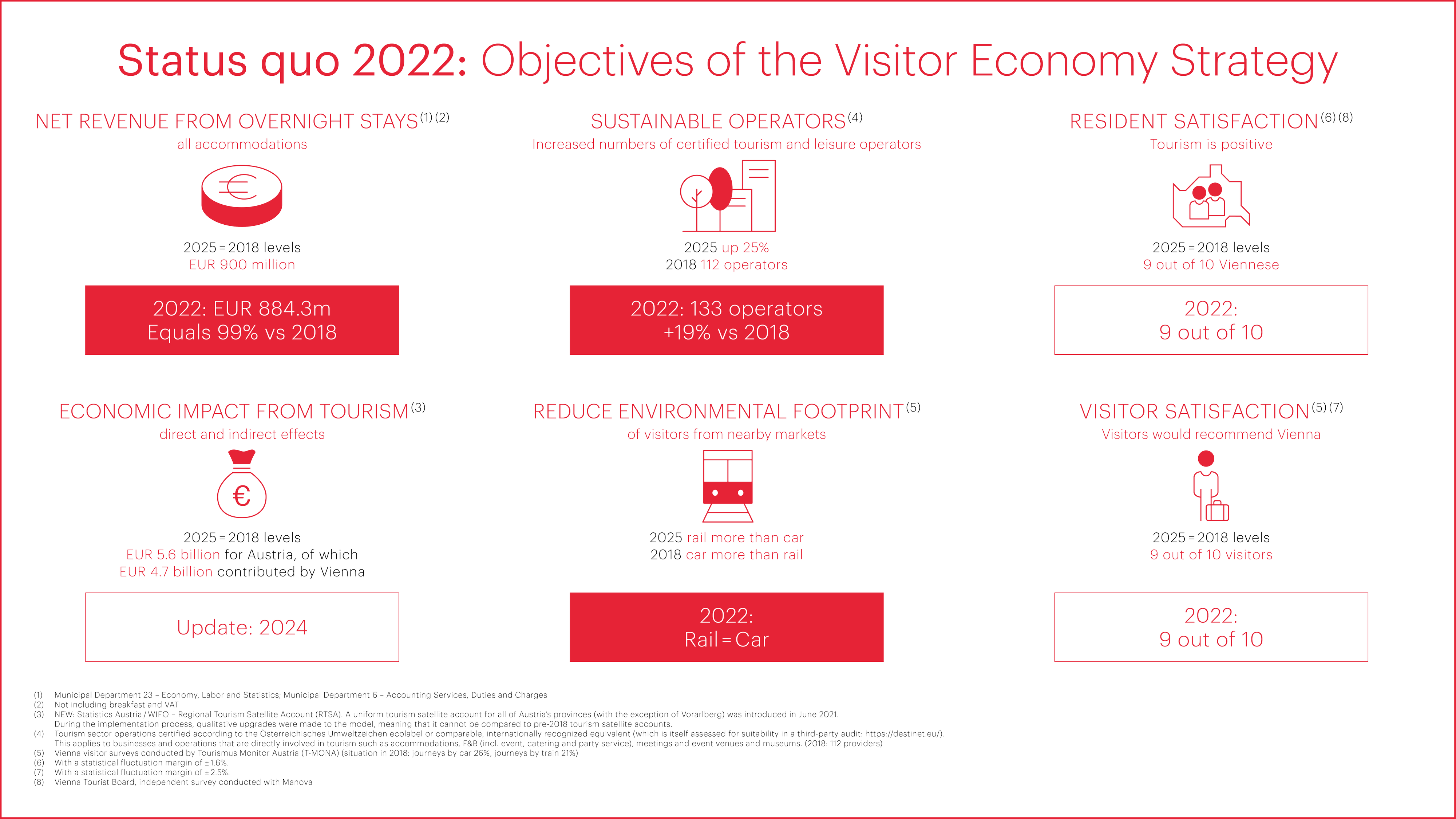Quality the Norm – Sustainability Paramount
A defining element of the Vienna Tourist Board’s future development, environmental, economic and social sustainability is also reflected in each of the objectives set out in the Visitor Economy Strategy, which was presented in October 2019. Just a few months after the City of Vienna unveiled its Vienna Tourist Board-led strategy, the coronavirus pandemic triggered the biggest crisis the international tourism industry had ever faced. Many of the approaches that had been adopted during times of growth proved to be every bit as relevant as the capital made its way out of the crisis. As a result, the fundamental principles remained the same, even though some of the quantitative targets that were set before the outbreak of the pandemic were aligned to reflect the change in circumstances.
Six Objectives to Measure Progress
Vienna's Visitor Economy Strategy sets out six objectives to be achieved by 2025. Direct and indirect economic impact induced by tourism in Vienna and Austria to return to 2018 levels by 2025: EUR 5.6 billion for Austria, of which EUR 4.7 billion contributed by Vienna (objective no. 1). This is calculated using data from the Regional Tourism Satellite Account of Statistics Austria and WIFO, which also makes it possible to compare tourism destinations with one another. In 2018, Vienna was the second-strongest province for tourism in Austria (after Tyrol and ahead of Salzburg) in terms of value added and tourism spending. Net revenue from overnight stays generated by the accommodation industry – a core sector of the visitor economy – to return to its pre-crisis (2018) total of around EUR 900 million by 2025 (objective no. 2). The top ratings in terms of quality of visitor experience (nine out of ten people would recommend Vienna to others) and residents’ attitudes to tourism (nine out of ten see tourism as a positive for Vienna) should be maintained (objectives no. 3 and 4). Performance is monitored through the regular Tourismus Monitor Austria survey and the annual poll of around 3,600 residents of Vienna on acceptance of tourism conducted on behalf of the Vienna Tourist Board. Both indicators held firm during the pandemic.
Another focus is the continued reduction of the environmental footprint attributable to tourism and continuing to expand Vienna’s pioneering role as far as eco-certification within the visitor economy is concerned. Around a fifth of all Austrian ecolabel-certified accommodation providers are located in Vienna, which also accounted for around 40% of the nation’s certified beds at the end of 2022. Under the Visitor Economy Strategy, by 2025 the number of hotels and other tourism institutions – from museums to restaurants – that are certified with the ecolabel or an equivalent, internationally recognized environmental certificate should increase by 25% to 140 (objective no. 5). By way of reference, the number of certified establishments has already increased from 112 in 2018 to 133 in 2022. To help achieve this, the Vienna Tourist Board is increasingly profiling providers that offer sustainable travel experiences, and has itself launched a number of initiatives. In one such example, the Vienna City Card was awarded the Austrian ecolabel in 2022 for its environmentally friendly mobility offering. In future, only certified accommodation partners will be able to qualify as card affiliates.
In line with the objectives set out in the Visitor Economy Strategy, travel by environmentally friendly means of transport should be promoted, especially from nearby markets. By 2025 the goal is to reverse the proportions of visitors who arrive by car (2018: 26%) and by rail (2018: 21%) (objective no. 6). In 2022, train travel and car travel accounted for roughly equal shares (at around 30% and 29% respectively; fluctuation range: ±2.5%). However, it should be noted that these figures are slightly distorted due to the shift in the visitor demographic during the pandemic, and as such should not be used to draw any conclusions for subsequent years, as the share contributed by long-haul markets – which can only reach Vienna by air – will increase once again. In addition to a concerted effort to encourage more visitors to travel by rail, the Vienna Tourist Board continues to put the emphasis on air travel in Vienna's tourism modal split when it comes to long-haul markets. The Vienna Tourist Board itself has been offsetting emissions from its own business trips involving air travel through the Climate Austria initiative since 2020.
Strengthening Network Function: Broad Cooperation on Air and Rail Travel
As Vienna emerged from the pandemic, the Vienna Tourist Board carefully positioned the city once again as a living art, culture and meeting center in a total of 12 markets in 2022 – including in the luxury segment, which generates a significant proportion of value added. Due to the travel restrictions imposed in response to the pandemic, 70% of the market budget was allocated to local markets, with the remainder earmarked for long-haul markets. While the main focus was on Germany, France, the UK, Italy and the USA, activities were also carried out in the Arab countries, Belgium, China, Japan, Austria, Switzerland and Spain.
The Vienna Tourist Board used international mobility partnerships – primarily involving national carrier Austrian Airlines, Vienna Airport and the Austrian Federal Railways – to help bring air and rail accessibility back to customary levels within the framework of the city’s (Smart) Air Service Development and Rail Service Development programs. The City of Vienna backed the marketing partnership between the Vienna Tourist Board and Austrian Airlines with additional funding of EUR 500,000. The special allocation was primarily used to reactivate the long-distance markets, chief among them the USA, which became the first long-distance market to return to full strength, at the end of 2022.
Membership of international networks such as UNWTO, the City Destinations Alliance, the World Tourism Cities Federation and the International LGBTQ+ Travel Association is a cornerstone of the Vienna Tourist Board's strategy, as is the Vienna Convention Bureau’s membership of the International Congress and Convention Association and the Professional Convention Management Association, among other organizations.


